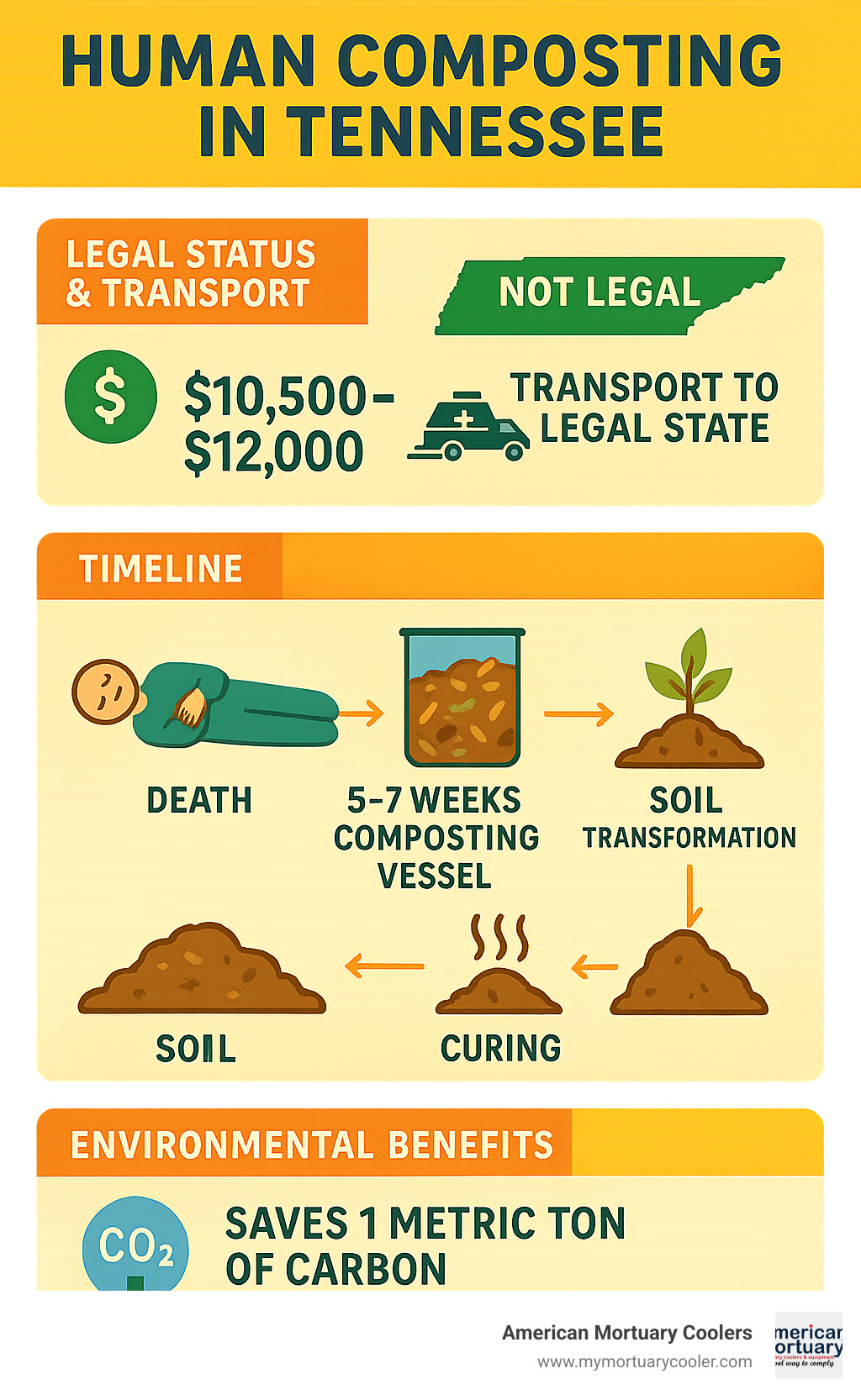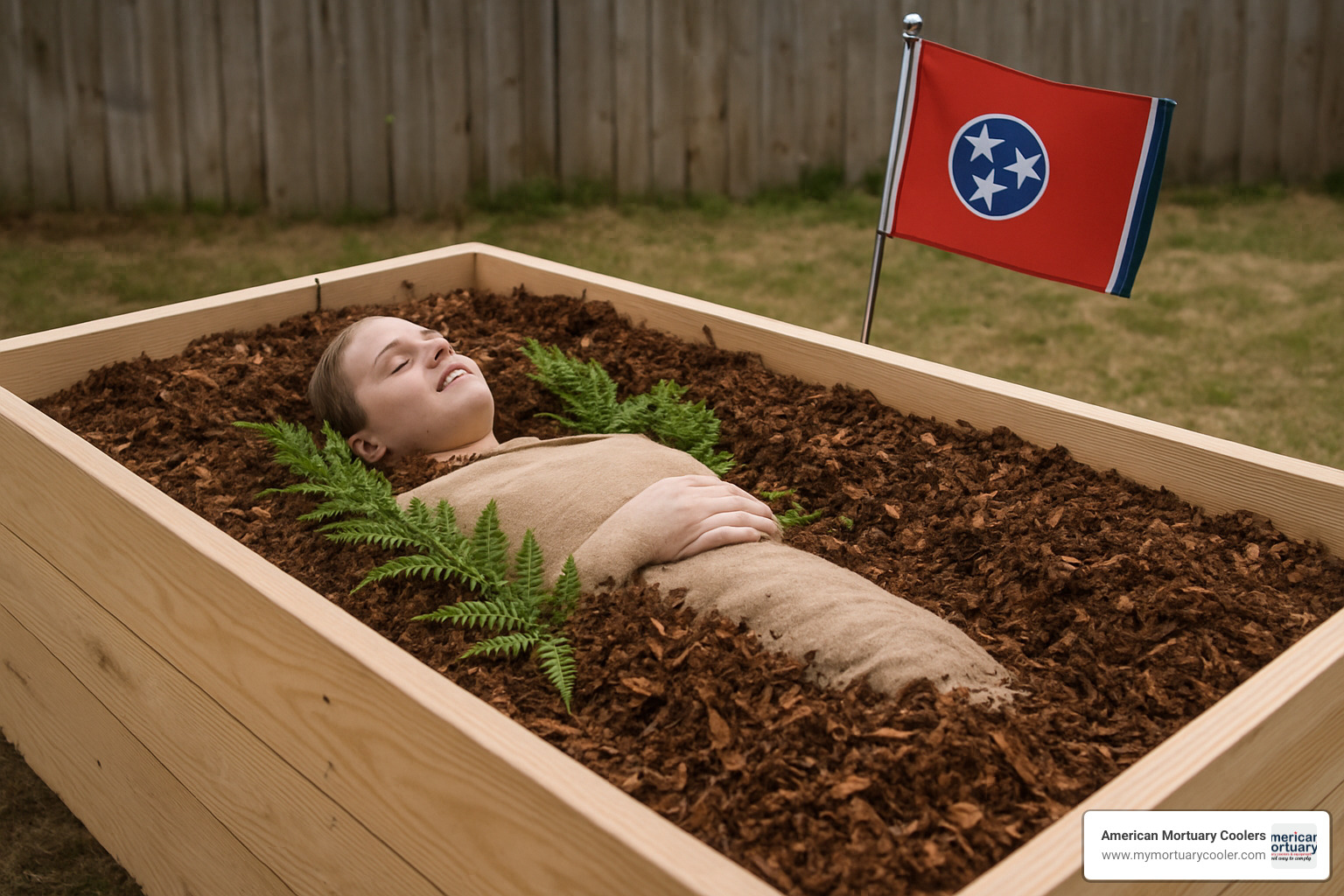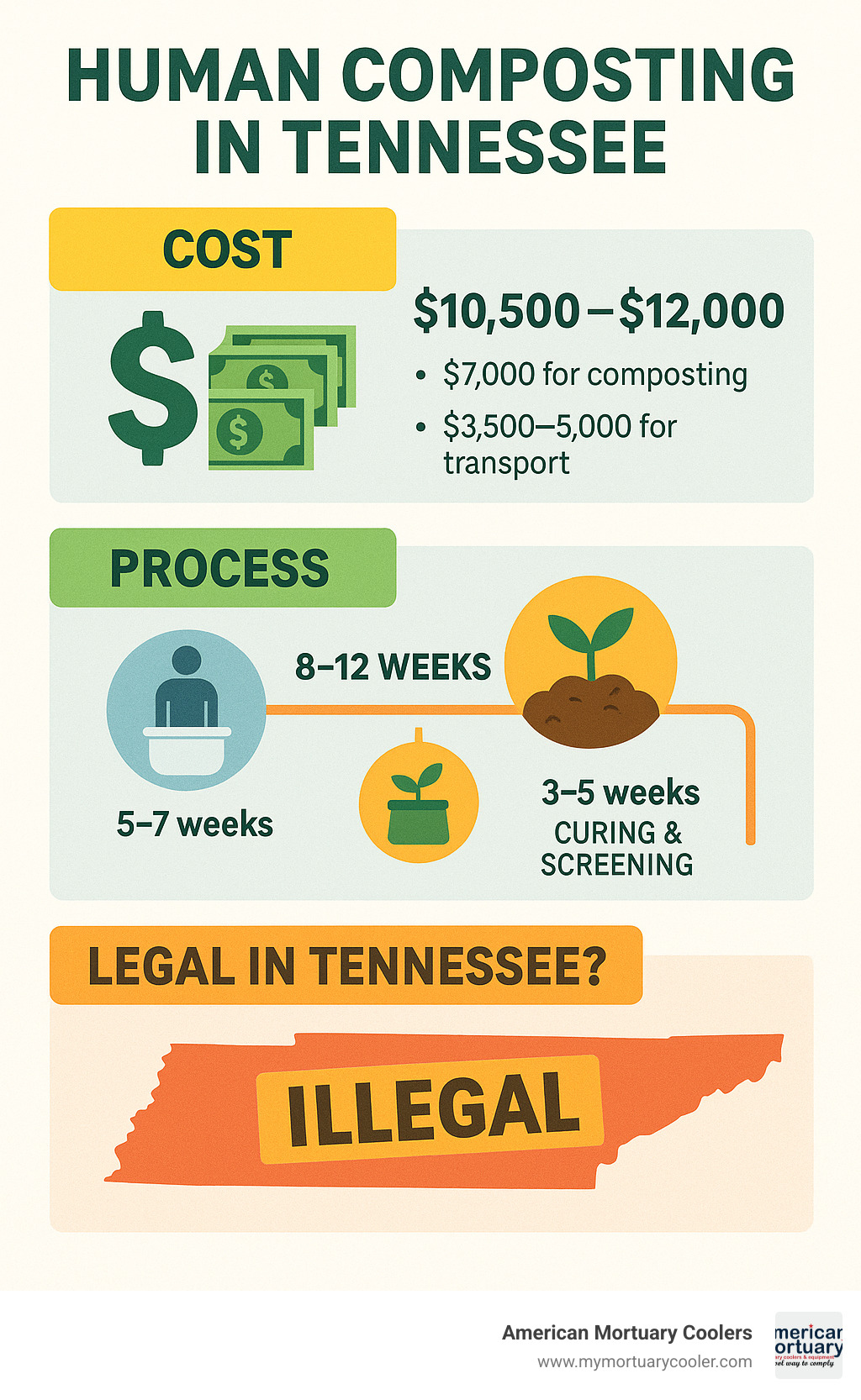What Tennessee Families Need to Know About Human Composting
Human composting Tennessee residents are increasingly interested in, but it's not yet legal within state borders. Here's what you need to know right now:
Quick Facts:
- Legal Status: Not currently legal in Tennessee
- Access: Available through transport to Washington, Oregon, Colorado, or other legal states
- Total Cost: $10,500-$12,000 (includes $7,000 service fee + $3,500-$5,000 transport)
- Timeline: 8-12 weeks for complete soil change
- Result: About 1 cubic yard of nutrient-rich soil per person
Human composting, also called natural organic reduction, transforms human remains into soil using natural materials like wood chips, alfalfa, and straw. The process takes place in specialized vessels where microbes break down the body over 5-7 weeks, followed by a 3-5 week curing period.
While Tennessee families can't access human composting locally yet, they can arrange transport to facilities in states where it's legal. This involves working with local funeral homes to handle permits and shipping, ensuring the body isn't embalmed, and coordinating with providers like Recompose in Washington or Return Home.
The environmental benefits are significant – human composting saves approximately one metric ton of carbon pollution compared to cremation and uses 87% less energy than traditional burial or cremation methods.
I'm Mortuary Cooler, and I've worked extensively with funeral directors across Tennessee who are preparing for the potential legalization of human composting Tennessee-wide by investing in proper cooling and transport equipment. My experience has shown that having the right mortuary infrastructure is crucial for families considering this eco-friendly option.

Find more about human composting Tennessee:
Understanding Human Composting: Process, Science, and Environmental Impact
Picture walking through a Tennessee forest in autumn. Leaves drift down, branches fall, and everything naturally breaks down into rich, dark soil that feeds new life. Human composting Tennessee families are exploring works exactly like this - but in a carefully controlled way that's both faster and safer.
The process starts when a body is gently placed in a special vessel alongside three key ingredients: wood chips (which provide carbon), alfalfa (for nitrogen), and straw (which helps air flow through everything). Think of it like building the perfect compost pile, but with scientific precision.
Here's where the magic happens. Tiny microbes - the same ones that break down leaves in your backyard - get to work. As they do their job, they create heat that reaches 130-160°F. This temperature is hot enough to eliminate any harmful bacteria while speeding up the natural breakdown process.
The whole change takes 8-12 weeks total. For the first 5-7 weeks, the microbes are actively working. Then comes a 3-5 week curing period where everything settles into beautiful, fertile soil.

What comes out is remarkable: about one cubic yard of nutrient-rich soil - that's roughly 500 to 1,000 pounds. The pH sits perfectly between 6.5 and 7, which is ideal for growing almost anything.
The environmental difference is stunning. Scientific research on cremation emissions shows that traditional cremation pumps about 700 million pounds of CO2 into our atmosphere every year in the United States alone. Human composting flips this completely - it uses 87% less energy than cremation and actually stores carbon in the soil instead of releasing it into the air.
If you want to dive deeper into how the science works, our can-human-bodies-be-composted-a-comprehensive-guide breaks down all the technical details.
Human Composting vs. Burial & Cremation
When Tennessee families compare their options, the differences go way beyond just environmental impact:
| Aspect | Human Composting | Traditional Burial | Cremation |
|---|---|---|---|
| Cost | $7,000 + transport | $7,848 median | $6,970 median |
| Carbon Impact | Saves 1 metric ton CO2 | High (casket production, land use) | Emits 534 lbs CO2 per body |
| Energy Use | 87% less than cremation | Moderate (manufacturing) | 30 gallons fuel per body |
| Land Use | None | Permanent plot required | None |
| End Result | 1 cubic yard fertile soil | Preserved remains | 3-7 lbs ash |
| Timeline | 8-12 weeks | Immediate | 2-3 hours |
Traditional burial eats up about four million acres of forest every year just for casket production. Cremation burns through massive amounts of fossil fuel - about 30 gallons per person. Human composting sidesteps both problems while creating something genuinely useful.
Environmental Benefits Specific to Tennessee Ecosystems
Tennessee's landscape - from the Cumberland Plateau's rolling hardwood forests to the rich bottomlands near the Mississippi - could really benefit from human composting soil. With 52% of Tennessee covered in forests, we face ongoing challenges with soil erosion, especially where logging and development have taken their toll.
The soil that comes from human composting has exactly the right pH and minerals for Tennessee's native plants. Think dogwoods, redbuds, and our beautiful oak trees. In states where human composting is already legal, conservation groups use donated soil to bring damaged habitats back to life.
For Tennessee specifically, this soil could help heal the Cumberland Plateau's old mining scars or support reforestation efforts in areas hit by the emerald ash borer. The carbon sequestration potential is especially meaningful as Tennessee works toward reducing greenhouse gas emissions.
Is Human Composting Tennessee-Ready? Legal Landscape & Future Legislation
Currently, human composting Tennessee residents seek must be accessed through interstate transport, as the practice remains illegal within state borders. Tennessee joins the majority of U.S. states that have not yet legalized natural organic reduction, though the landscape is changing rapidly.
As of 2024, human composting is legal in 12 states: Washington (first to legalize in 2019), Colorado, Oregon, Vermont, California, New York, Nevada, Arizona, Maryland, Delaware, Minnesota, and Maine. Georgia recently became the 13th state to legalize the practice. The legislative momentum suggests more states will follow suit, with bills introduced or reintroduced in multiple state legislatures each session.
Where "Human Composting Tennessee" Stands Today
While human composting Tennessee facilities don't exist yet, Tennessee residents can still choose this option by arranging transport to legal states. Both Recompose and Return Home serve families from all 50 states, including Tennessee. The process requires working with local funeral homes to obtain proper transport permits and ensure the body isn't embalmed before shipping.
The key requirement is that bodies must not be embalmed, as the chemicals used in embalming prevent the natural microbial decomposition process. This means families need to work with funeral directors who understand the specific requirements for human composting transport.
Efforts to Legalize Human Composting Tennessee-Wide
Legislative advocacy organizations are working to bring natural organic reduction to Tennessee, though specific bill numbers and sponsors haven't been publicly announced for the 2024-2025 legislative session. The movement typically follows a pattern seen in other states:
- Consumer Interest: Growing public awareness and demand
- Industry Preparation: Funeral homes and related businesses preparing infrastructure
- Legislative Introduction: Bills introduced in state legislature
- Regulatory Framework: Development of health department regulations
- Implementation: First facilities opening for business
Advocacy groups often point to the environmental benefits and consumer choice as primary arguments for legalization. The funeral industry's acceptance has grown significantly, with organizations like the Cremation Association of North America (CANA) providing educational resources about natural organic reduction.
Arranging Human Composting From Tennessee: Step-by-Step Guide
When Tennessee families choose human composting, the journey begins with understanding that while the process isn't available locally yet, it's absolutely achievable with proper planning. The key is working with providers who specialize in serving families nationwide, even from states where human composting isn't legal.
Your first decision is choosing a provider. Currently, two main companies serve human composting Tennessee residents: Recompose in Seattle, Washington, and Return Home in Auburn, Washington. Both understand the complexities of interstate arrangements and offer 24/7 support for immediate-need situations.
The next crucial step is finding a Tennessee funeral home that can coordinate transport. Not every funeral director has experience with human composting arrangements, so it helps to be direct. When you call, try saying something like: "I need to arrange transport to Seattle for human composting services. Can you help coordinate the permits and shipping?"
Here's where things get technical: no embalming can occur. The chemicals used in traditional embalming completely prevent the natural decomposition process that makes human composting possible. This means timing becomes critical, especially if transport takes a day or two to arrange.
Transport costs typically range from $3,500 to $5,000 depending on your location within Tennessee. The composting service itself costs around $7,000, bringing total expenses to $10,500-$12,000.

Documentation involves more coordination than complexity. Your chosen provider handles most paperwork on their end, while the Tennessee funeral home manages permits and death certificates. The providers have streamlined this process significantly - they know exactly what's needed and when.
At American Mortuary Coolers, we've worked with funeral homes across Tennessee to ensure they have proper cooling equipment for situations exactly like this. When transport takes an extra day to coordinate, having reliable cooling equipment becomes essential for maintaining dignity throughout the process.
For families wanting deeper technical understanding of what happens after transport, our in-depth-guide-to-human-body-composting covers the entire composting timeline in detail.
Immediate-Need Checklist for Tennessee Families
When death has occurred and a Tennessee family has chosen human composting, time becomes important but not frantic. The providers understand that coordinating interstate arrangements takes longer than local services.
Within the first 24 hours, contact your chosen provider immediately. Recompose can be reached at 206-800-8733, while Return Home's number is 206-888-4663. Both maintain 24/7 availability for immediate-need calls. Simultaneously, begin contacting Tennessee funeral homes about transport arrangements. Be upfront about the no-embalming requirement from your very first conversation.
The second day focuses on logistics. Confirm transport quotes from multiple funeral homes if possible - costs can vary significantly. This is also when proper cooling becomes critical. If transport can't be arranged immediately, the body needs professional-grade cooling equipment to maintain dignity and meet health requirements.
By the end of the first week, all arrangements should be finalized. Death certificates need to be processed, permits completed, and transport scheduled.
Pre-Planning & Insurance Options
Pre-planning removes tremendous stress from grieving families while often saving money. Both major providers offer payment plans starting at $100 per month, making the financial commitment manageable over time. More importantly, pre-planning ensures availability and locks in current pricing.
Life insurance typically covers human composting costs easily. Total expenses of $10,500-$12,000 fall within most life insurance policy ranges. Some insurance companies may require documentation that human composting is legal in the state where services occur, but the providers can supply necessary documentation.
Pre-need contracts offer additional protection. If human composting becomes legal in Tennessee before services are needed, many providers will honor existing contracts while potentially reducing transport costs.
Ceremonies, Culture, Soil Use, and Faith Considerations
Human composting doesn't mean saying goodbye to meaningful ceremonies - it creates space for new kinds of remembrance that many families find deeply healing. The process naturally unfolds in two distinct phases, each offering its own opportunities for connection and ritual.
The "laying in" ceremony has become one of the most cherished aspects of human composting. This is when your loved one is gently placed in the composting vessel, surrounded by the organic materials that will help them transform into soil. Both Recompose and Return Home have designed beautiful ceremony spaces where families can gather in person or join virtually from anywhere, including Tennessee.
What makes these ceremonies special is how personal they can be. Families often decorate the vessels with photos, flowers, and meaningful objects that tell their loved one's story. Some families write letters to place alongside the body. Others bring favorite music or poems to share during the ceremony.
During the 8-12 week change period, Return Home allows families to visit their loved one's vessel during business hours. This ongoing connection helps some families process their grief gradually.
The soil ceremony - when the completed soil is returned to the family - often becomes the most powerful moment of all. This is when many families truly feel the life-giving nature of what has happened.
For families wanting to learn more about the entire process, our beginners-guide-to-terramation-understanding-human-composting covers everything from start to finish.
Using the One Cubic Yard of Soil
That 1,000 pounds of rich, fertile soil opens up possibilities that traditional burial or cremation simply can't offer. The soil isn't just a memorial - it's a living legacy that keeps giving back to the earth.
Memorial gardens have become incredibly popular with human composting Tennessee families. Native plants like dogwoods, redbuds, and Tennessee coneflowers thrive in the nutrient-rich soil. Some families create dedicated spaces visible from kitchen windows or children's bedrooms, keeping their loved one close to daily life.
Food gardens might seem unusual at first, but many families find deep meaning in growing vegetables or fruit trees with their loved one's soil. There's something powerful about nourishing your family with food grown in soil that came from someone who nourished you throughout life.
Conservation donation through the providers' land programs lets families contribute to larger environmental projects. Return Home maintains an 8-acre woodland for ecosystem restoration, while Recompose partners with organizations working on forest restoration and habitat improvement.
Sharing among family members has created new traditions around memorial plantings. Siblings might each take soil to plant trees on their own properties, creating a network of living memorials connected by love and shared memories.
Meeting Religious & Cultural Needs
The relationship between human composting and faith communities continues to evolve, with many religious leaders finding ways to accept the practice's emphasis on returning to the earth and caring for creation.
Catholic families have noted how composting fulfills traditional committal prayers about "earth to earth, ashes to ashes, dust to dust." While the Vatican hasn't issued official guidance specifically on human composting, many Catholic families have found peace in the practice's alignment with creation-care teachings.
Protestant denominations often appreciate the environmental stewardship aspects of human composting. Many families incorporate traditional hymns and scriptures about caring for God's creation into their laying-in ceremonies.
Both major providers work closely with families to accommodate religious and cultural needs. This might mean coordinating with clergy for spiritual guidance, allowing custom prayers and blessings during ceremonies, or adjusting timing to accommodate religious observances.
Interfaith services have become increasingly common, especially in families where different religious traditions come together. The ceremony spaces allow for blending traditional religious elements with the ecological aspects of human composting in ways that feel authentic to each family's beliefs.
Frequently Asked Questions About Human Composting in Tennessee
When Tennessee families first learn about human composting, they naturally have questions about how it works, what it costs, and what the process actually looks like. Let me walk you through the most common concerns I hear from families across our state.
Is human composting legal for Tennessee residents right now?
Human composting Tennessee residents can choose, but it requires some planning. The process isn't legal within our state borders yet, but that doesn't mean it's off-limits. Tennessee families can arrange transport to states where it's perfectly legal - places like Washington, Oregon, and Colorado.
Both major providers, Recompose and Return Home, welcome families from all 50 states. They've worked with hundreds of Tennessee families already, so the interstate process is well-established and respectful.
The key is working with a local funeral home that understands the transport requirements. Not every funeral director has experience with this yet, but more are learning as demand grows.
How much does the full process cost including transport?
The honest answer is $10,500 to $12,000 total for most Tennessee families. Here's how that breaks down:
The human composting service itself costs $7,000 - that's the same whether you live in Tennessee or Washington. The variable cost is transport, which runs $3,500 to $5,000 depending on where you live in our state and which funeral home handles the logistics.
If you're in Nashville or Memphis, transport costs tend to be lower because of better shipping infrastructure. Rural areas might see higher fees, but the difference usually isn't dramatic. Some funeral homes also charge coordination fees, though many include this in their transport quote.
Compared to traditional burial at $7,848 or cremation at $6,970, human composting falls right in the middle cost-wise - but provides something neither of those options can: fertile soil that supports new life.
What happens to medical implants and bones?
This question comes up in nearly every conversation I have with families, and it's completely understandable. The providers handle this respectfully and thoroughly.
Medical implants get removed and recycled appropriately after the composting process is complete. Pacemakers, joint replacements, surgical screws, dental work - all of it gets carefully separated during the screening phase. Many implants contain valuable metals that can be recycled, which appeals to environmentally conscious families.
Bones and teeth don't fully break down during the natural composting process, which is normal. The providers mechanically reduce them to a fine powder and blend it back into the soil. This ensures the final product contains all the minerals and nutrients from the complete body - calcium, phosphorus, and other elements that plants love.
The result is genuinely fertile soil, not just symbolic earth. Families often tell me how surprised they are by how rich and healthy the soil looks when it's returned to them.
How long does the entire process take from death to receiving soil?
The complete timeline runs 8 to 12 weeks, and here's what happens during that time:
The active composting takes 5 to 7 weeks in the specialized vessel. During this phase, natural microbes break down the body using wood chips, alfalfa, and straw. The vessel maintains temperatures between 130-160°F, which eliminates pathogens while supporting the decomposition process.
After active composting comes 3 to 5 weeks of curing and screening. This is when the soil stabilizes, gets tested for safety, and has any non-organic materials removed. The providers are thorough about quality control - they want to return soil that families can use confidently.
Finally, there's packaging and return shipping to Tennessee. Most families choose to have the soil shipped back, though some donate it to conservation projects instead.
The providers keep families updated throughout the process. You'll know when composting begins, when curing starts, and when your soil is ready.
Can families visit during the composting process?
Return Home allows families to visit and even decorate the composting vessel during business hours throughout the entire process. Many families find this ongoing connection meaningful - they can bring flowers, photos, or other mementos and spend quiet time near their loved one.
Recompose takes a different approach. They offer beautiful ceremony spaces and facility tours, but don't typically allow ongoing visitation during the composting weeks. Their focus is on the laying-in ceremony at the beginning and the soil ceremony at the end.
Both providers offer virtual connection options for families who can't make multiple trips to the Pacific Northwest. Some families attend the laying-in ceremony in person, then participate virtually in the soil ceremony months later.
As someone who's worked with funeral homes across Tennessee, I know how important ongoing connection can be for grieving families. The good news is that both approaches - hands-on visiting or ceremonial bookends - provide meaningful ways to stay connected during the process.

Conclusion
The journey toward human composting Tennessee families can choose today represents something profound - a chance to transform our final act into one of regeneration rather than depletion. While Tennessee hasn't yet joined the growing list of states embracing natural organic reduction, the path forward is already being walked by families who refuse to let state borders limit their environmental values.
What strikes me most about working with funeral directors across Tennessee is their genuine care for families exploring this option. From the mountains of East Tennessee to the Mississippi River bottomlands, I've delivered mortuary cooling equipment to funeral homes preparing for a future where human composting Tennessee residents want becomes locally accessible.
The numbers tell an important story: one metric ton of carbon saved per person, 87% less energy than cremation, and one cubic yard of life-giving soil. But behind these statistics are real Tennessee families planting memorial dogwoods, restoring family farm soil, and creating gardens that bloom with the essence of their loved ones.
At American Mortuary Coolers, we've seen the infrastructure quietly building across Tennessee. Funeral homes investing in proper cooling systems. Directors learning transport requirements. Families asking thoughtful questions about sustainable death care. This groundwork matters because when Tennessee does legalize human composting - and the legislative momentum suggests it's a matter of when, not if - we'll be ready.
The beauty of human composting lies in its simplicity. No chemicals, no permanent land use, no fossil fuel consumption - just the same process that has recycled life on forest floors for millions of years, carefully managed and accelerated in controlled vessels. The resulting soil doesn't just honor the deceased; it actively nurtures new life for decades to come.
For families considering this path, the message is clear: don't wait for perfect circumstances. Pre-planning removes decision-making pressure from grieving family members while locking in current pricing. The transport logistics, while complex, are entirely manageable with proper funeral home coordination and adequate cooling equipment.
The soil that returns to Tennessee families carries more than nutrients. It carries hope - hope that our final contribution can be one of restoration rather than consumption, of growth rather than waste. Whether scattered in the Cumberland Mountains, mixed into community gardens, or donated to conservation projects, this soil represents our most lasting gift to the places and people we love.
For complete information about all aspects of this choice, our a-comprehensive-guide-to-human-composting-options covers everything families need to know.
The future of death care is already here for Tennessee families willing to reach for it. Human composting Tennessee residents choose today creates the foundation for tomorrow's more sustainable, more meaningful approach to our final journey home.


















